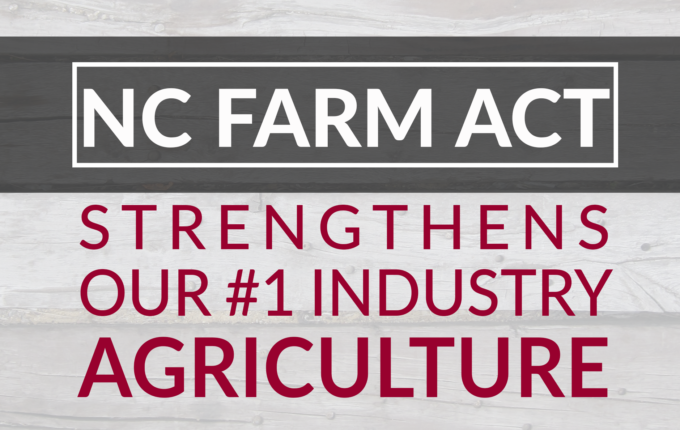Stick with us here. Most people probably understand the wisdom, or can at least appreciate the purpose, of maintaining your home. Over time your home gets cluttered, things break, and some of those deep, dark corners you never visit have to be dealt with. It’s not always a fun job, but doing it can make your home a more enjoyable place to live.
North Carolina’s statutes, just like a home, require ongoing maintenance. So it’s necessary, on occasion, for the Legislature to take a look at our statutes and clean up some of the confusing, unhelpful, and out-of-date provisions.
That’s where the annual Farm Act comes into play. Each year since 2013 state legislators have passed a Farm Act to make necessary changes to the law to better serve North Carolina’s farmers.
In the past, the Farm Act has addressed wide-ranging aspects of agriculture including transportation, legal liability, deregulation, clarifying terms and interpretation of federal laws, amongst many more.
The 2018 Farm Act is sponsored by Senators Brent Jackson, Bill Cook, and Norman Sanderson. Let’s get to the bill’s highlights:
Right-to-Farm
Last year we wrote about a serious threat to North Carolina’s ag economy: the arrival in 2013 of a group of out-of-state lawyers who make a living suing animal ag operations for nuisance. Fast forward five years. The cases developed and the court heard the first “bellwether” trial in April of this year. Unfortunately, it resulted in a $50 million damage award against Smithfield.
Of similar concern, several months before the first trial began a federal district court judge issued a ruling in the case that eviscerated North Carolina’s Right-to-Farm law, which protects every North Carolina farmer from nuisance lawsuits under certain conditions. The judge wrongly concluded that a farm isn’t protected by the law even when a plaintiff moves near the farm after it was established.
In response, S. 711 strengthens the Right-to-Farm defense and attempts to discourage future copycat lawsuits before they are filed.
Milk Labeling
In an effort to assist the struggling dairy industry and protect product integrity, the bill would direct the Food and Drug Protection Division of the Department of Agriculture and Consumer Services to immediately develop an enforcement plan to enforce the United States Food and Drug Administration’s standard of identity for milk. This would prohibit the sale of plant-based products mislabeled as milk, such as soy milk and almond milk. Enforcement could include notification of the Department’s intent to embargo all mislabeled products offered for sale in the State.
Farm Equipment Property Tax
The bill would require counties that use the “cost approach” in appraising farm equipment to use a standard depreciation schedule published by the N.C. Department of Revenue. The Department of Revenue must publish a depreciation schedule for farm equipment and make the schedule electronically available on its website. This ensures that depreciation schedules will be consistent across the state.
Additional Studies
The bill would instruct the Agriculture and Forestry Awareness Study Commission to study: (i) requiring the holders of unused rights-of-way and utility easements to offer the easements to the underlying property owners for fair market value; and (ii) the exclusion of property enrolled in the present use value taxation program from rural fire protection district and county service district taxes.
North Carolina has a rich agricultural tradition, and despite the growth of other industries in our state agriculture remains the state’s leading economic driver. That’s why the Farm Act is such an important piece of legislation, and one that North Carolina Farm Bureau supports wholeheartedly.


.jpg)